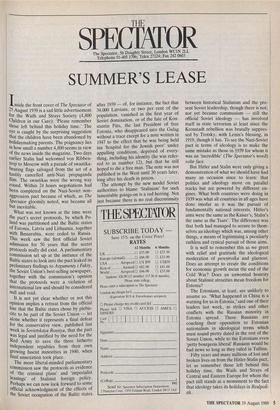SPECT TRE AT OR
The Spectator, 56 Doughty Street, London WC1N 2LL Telephone 01-405 1706; Telex 27124; Fax 242 0603
SUMMER'S LEASE
Inside the front cover of The Spectator of 25 August 1939 is a sad little advertisement for the Waifs and Strays Society (4,800 Children in our Care): 'Please remember those left behind this holiday time.' The eye is caught by the surprising suggestion that the children have been abandoned by h. olidaymaking parents. The poignancy lies in how small a number 4,800 seems in view of the news inside the magazine. Two days earlier Stalin had welcomed von Ribben- trop to Moscow with a parade of swastika- bearing flags salvaged from the set of a hastily cancelled anti-Nazi propaganda film. The swastikas were the wrong way round. Within 24 hours negotiations had been completed on the Nazi-Soviet non- aggression pact because of which, as The Spectator gloomily noted, war became all but inevitable.
What was. not known at the time were the pact's secret protocols, by which Po- land was partitioned and the Baltic states of Estonia, Latvia and Lithuania, together with Bessarabia, were ceded to Russia. This week saw the first official Soviet admission for 50 years that the secret protocols really did exist. A parliamentary commission set up at the instance of the Baltic states to look into the pact leaked its preliminary findings to Argumenty i Fakty, the Soviet Union's best-selling newspaper, together with the commission's opinion that the protocols were a violation of international law and should be considered null and void.
It is not yet clear whether or not this opinion implies a retreat from the official line that the Baltic states chose by plebis- cite to be part of the Soviet Union — let alone whether it represents a final defeat for the conservative view, published last week in Sovietskaya Rossiya, that the pact was legal and justified by the need for the Red Army to save the three hitherto independent republics from their own growing fascist minorities in 1940, when final annexation took place. The more liberal-minded parliamentary commission saw the protocols as evidence of 'the criminal plans' and 'imperialist leanings' of Stalinist foreign policy. Perhaps we can now look forward to some official acknowledgment of the effects of the Soviet occupation of the Baltic states after 1939 — of, for instance, the fact that 34,000 Latvians, or two per cent of the population, vanished in the first year of Soviet domination, or of the fate of Kon- stantin Pats, the last President of free Estonia, who disappeared into the Gulag without a trace except for a note written in 1947 to the effect that he was being held ina 'hospital for the Jewish poor' under appalling conditions, deprived of every- thing, including his identity (he was refer- red to as number 12), but that he still hoped to die a free man. The note was not published in the West until 30 years later, long after his death in prison. The attempt by the new model Soviet authorities to blame 'Stalinism' for such lamentable goings-on is a red herring. Not lust because there is no real discontinuity between historical Stalinism and the pre- sent Soviet leadership, though there is not; nor yet because communism — still the official Soviet ideology —, has involved itself in state terrorism at least since the Kronstadt rebellion was brutally suppres- sed by Trotsky, with Lenin's blessing, in 1919, though it has. To see the Nazi-Soviet pact in terms of ideology is to make the same mistake as those in 1939 for whom it was an 'incredible' (The Spectator's word) volte face.
But Hitler and Stalin were only giving a demonstration of what we should have had many an occasion since to learn: that politics and ideology move on parallel tracks but are powered by different en- gines. What both countries were doing in 1939 was what all countries in all ages have done insofar as it was the pursuit of fundamentally national interests. Hitler's aims were the same as the Kaiser's, Stalin's the same as the Tsars'. The difference was that both had managed to secure to them- selves an ideology which was, among other things, a means of legitimising a peculiarly ruthless and cynical pursuit of those aims.
It is well to remember this as we greet with relief and gratitude the ideological moderation of perestroika and glasnost.
Does an attempt to create the conditions for economic growth mean the end of the Cold War? Does an unwonted honesty about Stalinist atrocities mean freedom for Estonia?
The Estonians, at least, are unlikely to assume so. 'What happened in China is a warning for us in Estonia,' said one of their leaders last week, as strikes and other conflicts with the Russian minority in Estonia spread. These Russians are couching their opposition to Estonian nationalism in ideological terms which must sound pretty dated in the rest of the Soviet Union, while to the Estonians even `petty bourgeois liberal' Russians would be bad news so long as they ruled in Tallinn.
Fifty years and many millions of lost and broken lives on from the Hitler-Stalin pact,
let us remember those left behind this holiday time, the Waifs and Strays of Central and Eastern Europe for whom the pact still stands as a monument to the fact I that ideology takes its holidays in Realpoli- tik.


















































 Previous page
Previous page